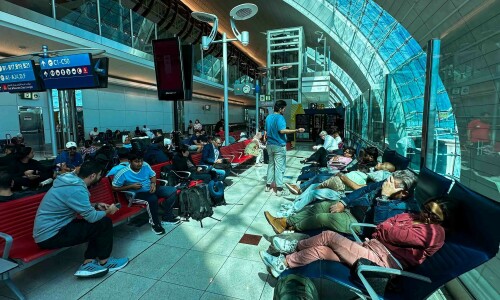
Chemotherapy is a treatment used in medicine to cure the body of deadly cancerous tumors: it functions like a poison that can kill off the body if used excessively but can also cure the body if implemented correctly. The use of suo motu by the Supreme Court of Pakistan, where a judge accepts a case on its initiative, is much like chemotherapy.
The use of suo motu judicial review by the court has helped to shed light on issues left untouched by the elected branches, and thus treats the nation’s cancers. However, without a method to determine when it is proper to use this judicial tool, suo motu could “poison the system,” by politicising the court and creating rifts between the branches of government.
The use of suo motu is an anomaly to the South Asian subcontinent, with India and Pakistan having constitutional provisions allowing the court to exercise jurisdiction even when the technical requirements for a case have not been satisfied.
Under Chief Justice Iftikhar Muhammad Chaudhry, the court has relied on its constitutional right to take suo motu action. In Article 184 (3) of Pakistan’s Constitution, the Supreme Court is allowed to take suo motu action whenever there is a possible violation of fundamental rights enumerated in Chapters 1 and 2. Thus, the court has initiated several cases based on news stories that appeared in the print or electronic media or letters sent to the court by common citizens. Though a news story or a citizen letter does not fulfill the legal requirements of filing a plea with the court, the Court has been willing to take action.
Justice Shri V. R. Krishna Iyer of the Indian Supreme Court stated that such judicial activism shows that “the true strength and stability of our polity is the society’s credibility in social justice, not perfect ‘legalese’”.
The speedy and public trial of the Rangers who shot and killed Sarfraz Shah on videotape in Karachi is a prime example of the positive use of suo motu by the court. By most accounts, the commanding officers in this instance attempted to avoid prosecuting the murderous Rangers and concealed evidence of the heinous crime. Had the Supreme Court not exercised its suo motu powers, Mr. Shah’s killer would continue to roam the streets with the ability to repeat his cowardly act on another civilian.
The second positive example of the use of suo motu came in 2006 when the court attempted to address the problem of missing persons in Balochistan. The court acted to preserve the right of habeas corpus guaranteed by the Pakistani constitution which states that an individual who is arrested by a state actor must be presented publicly and told the allegations against him. Though the Court threatened to awaken the beast of the Army, who had long-maintained a policy of extrajudicial action against civilians, this use of suo motu is a medicine for the cancer of Army-inflicted human rights abuses.
Justice Khawaja Muhammad Sharif defended the use of suo motu by stating he “will take notice of every matter in which the executive is showing slackness.” As Saroop Ijaz, renowned legal commentator, states, “such a presumption that suo motu can be used to remedy inaction by elected officials exposes some of the negative characteristics of judicial activism.”
The use of suo motu is a game-changing feature to the balance of powers between the Parliament, Supreme Court, and the President’s office. However, if the practice is overused, it could cause an all out rebellion and refusal by elected officials to enact the decisions of the Court. This would be devastating to the credibility of the institution and render it as powerless as during the days of dictatorial rule. In fact, some have argued that the recent spate of judicial activism has led to several instances where the judicial branch and executive were so conflicted that there was no effect of the Supreme Court’s decisions.
Furthermore, by continually acting on issues where the executive branch has not yet taken action, the Court could foster a dependant relationship between itself and the President. This could be damaging not only by inundating the court with political decisions it is unequipped to make, and by weakening the willingness of the Executive to be proactive in their approach to running the affairs of the nation.
There is also an issue with the randomness by which the court has recently exercised its suo motu powers. One anomalous case that has resulted in many critiques against the Court was the decision to take notice of the detention of Atiqa Odho when she was found to have been in possession of alcohol. This judicial action exposed a serious question that must be asked: is there any system or legal logic the court utilises to determine when they may exercise suo motu?
It is up to the court to determine what rights should be protected by their use of suo motu but what is far important is how those rights will be protected. If the court acts without a method to pass along to future jurists, it threatens creating chaos. If suo motu is overused, it could alienate the army and elected branches to the point of open defiance. And finally, just as the Supreme Court needs time to develop itself, the executive branch should be given enough leeway to take actions independent of judicial decree.
However, if the court allows judicial formalism to stand in the way of taking immediate action, the cancers of Pakistan could kill the country. The court could successfully cure many of the nation’s cancers only by taking a deliberate approach to addressing injustices in its society through a legal framework that respects the balance of power and can be expanded on by jurists to come.
The writer holds a Juris Doctorate in the US and is a researcher on comparative law and international law issues.














































